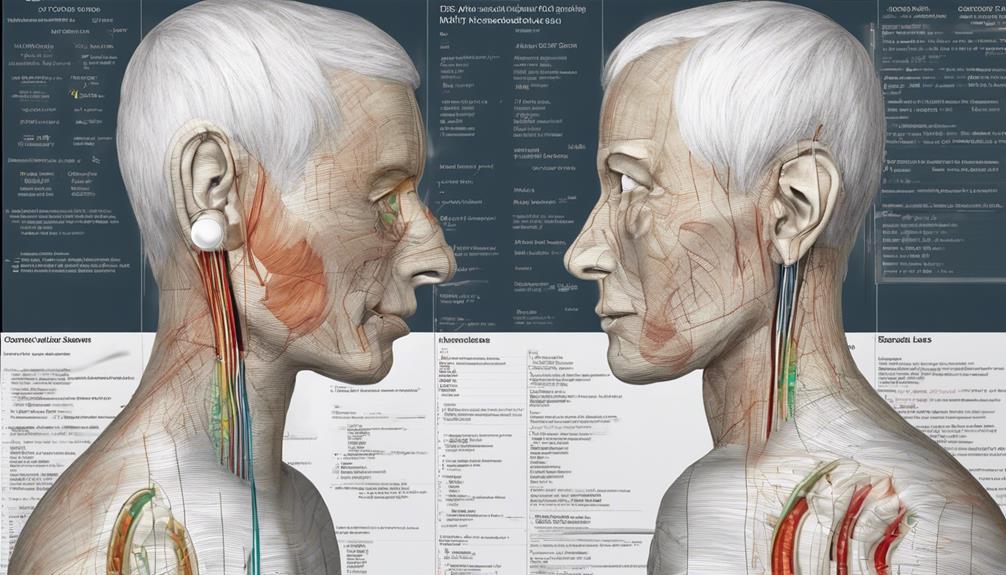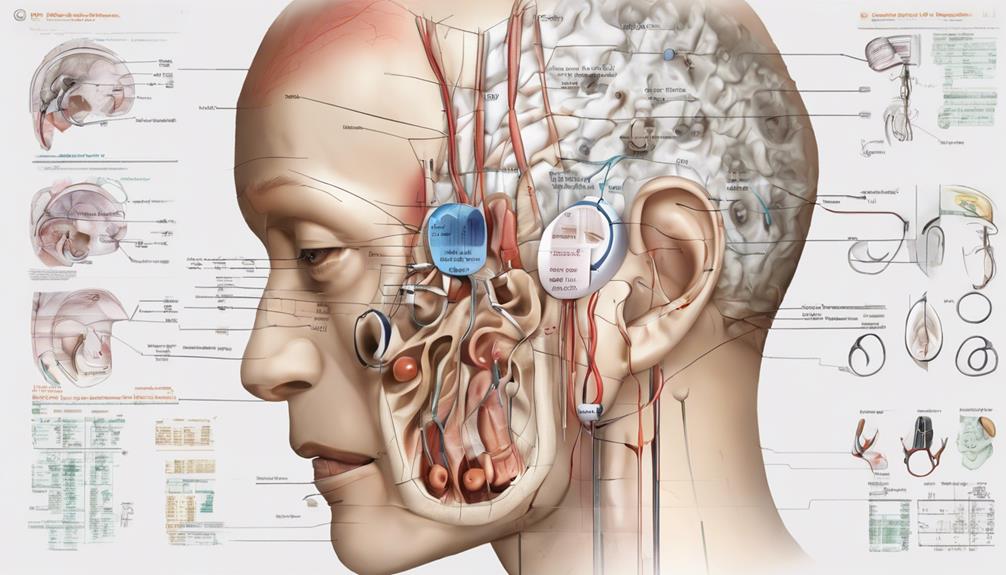In the vast world of medical coding, finding the correct ICD codes for hearing loss in the right ear can feel like searching for a needle in a haystack. However, with careful attention to detail and a systematic approach, we can unravel the complexities of these codes.
By understanding the underlying principles and nuances of coding for right ear hearing loss, we can ensure precision in our diagnostic processes and streamline our billing procedures. Stay tuned to uncover the key strategies and insights that will help demystify the realm of ICD coding for right ear hearing loss.
Key Takeaways
- Utilize specific ICD-10 codes like H90.41 for unilateral sensorineural hearing loss
- Accurate documentation of affected ear with H91.91 for right ear unspecified hearing loss
- Precision in coding aids in treatment planning, billing accuracy, and healthcare data quality
- Compliance with WHO guidelines ensures proper transition and clear communication in healthcare
Importance of Right Ear Hearing Loss ICD Codes
Understanding the significance of right ear hearing loss ICD codes is essential for efficient healthcare management. Proper coding for hearing loss in the right ear plays a crucial role in accurately diagnosing patients and developing effective treatment plans. By utilizing specific ICD codes for right ear hearing loss, healthcare providers can ensure that information is clearly communicated among the medical team, promoting cohesive and comprehensive care. Moreover, these codes streamline billing and insurance processes, facilitating smoother transactions and reducing the risk of errors in financial documentation.
Additionally, incorporating the correct ICD codes for right ear hearing loss in medical records is paramount for maintaining accurate patient histories. These codes serve as a standardized language that enhances the quality of healthcare data, enabling healthcare professionals to track the progression of conditions and treatments effectively. Therefore, understanding and utilizing right ear hearing loss ICD codes are integral components of providing optimal patient care and facilitating efficient healthcare operations.
Understanding ICD-10-CM Coding Guidelines
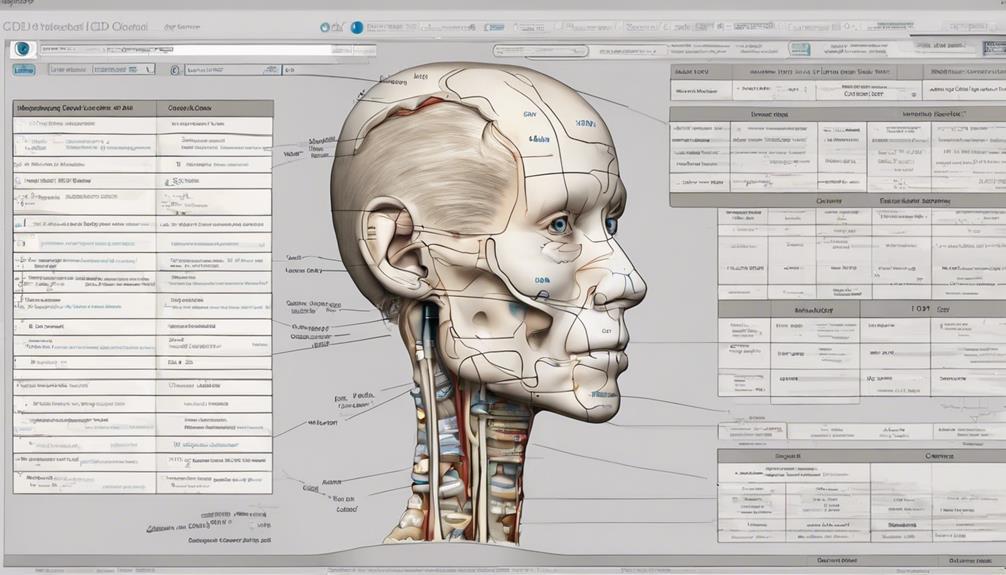
To proficiently code for right ear hearing loss under the ICD-10-CM system, healthcare providers must accurately apply specific codes that detail the type and laterality of the condition. Understanding the guidelines for ICD-10-CM coding is crucial to ensure accurate documentation of right ear hearing loss. It's essential to utilize the appropriate ICD-10-CM codes such as H90.41 for unilateral sensorineural hearing loss in the right ear. Familiarizing oneself with the descriptors, exclusions, and specific instructions for coding right ear hearing loss can enhance the precision of medical records.
Healthcare professionals should also make use of crosswalks to transition smoothly from ICD-9-CM to ICD-10-CM codes for right ear hearing loss. Compliance with the World Health Organization (WHO) classification and category guidelines is imperative for accurate coding and proper categorization of right ear hearing loss cases. By adhering to these coding guidelines and standards, providers can ensure compliance and maintain high-quality healthcare services for patients with right ear hearing impairments.
Specificity in Coding for Right Ear Hearing Loss
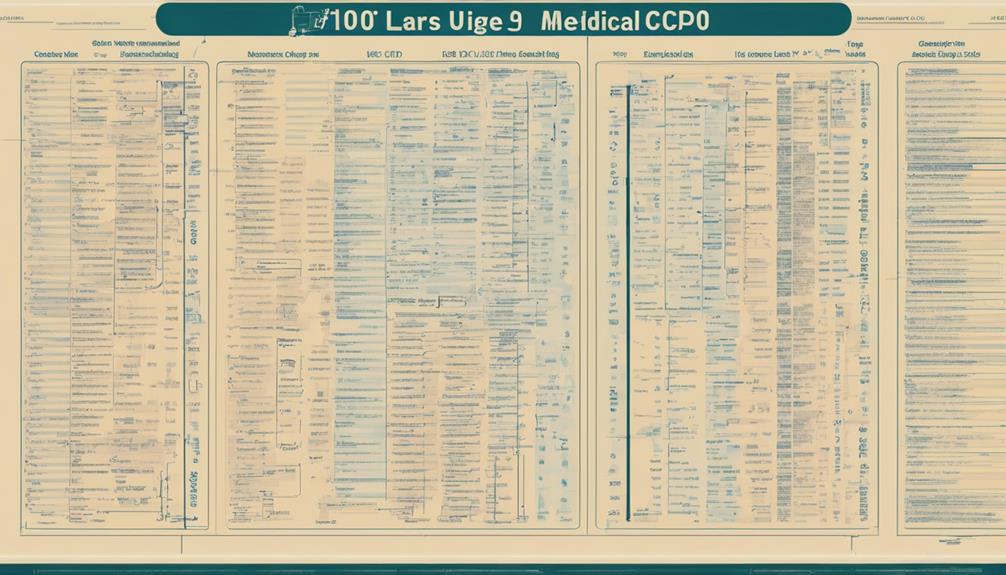
For accurate coding of right ear hearing loss, specificity in documenting the affected ear is crucial. When dealing with right ear hearing loss, utilizing the ICD-10 Code H91.91 for unspecified hearing loss in the right ear is essential. This code should be applied when the documentation doesn't provide further details regarding the right ear hearing impairment.
It's imperative to adhere to coding guidelines that stress the significance of specificity in noting ear-specific conditions. By ensuring precise coding that specifies the right ear as the affected side, healthcare professionals facilitate accurate billing processes and streamline treatment planning.
Therefore, when diagnosing right ear hearing loss, it's imperative to emphasize the ear in question to guarantee proper coding, which in turn aids in effective billing procedures and targeted treatment strategies.
Billing Considerations for Hearing Loss ICD Codes

When billing for right ear hearing loss, meticulous documentation is critical to ensure accurate coding and proper reimbursement. It's essential to use the correct ICD-10 code, such as H91.91 for unspecified hearing loss in the right ear, to support the diagnosis.
Understanding insurance coverage and guidelines related to right ear hearing loss is crucial for successful billing processes. Additionally, considering any additional diagnoses or symptoms that may affect the treatment plan is important for accurate billing.
Staying informed about coding changes and updates concerning right ear hearing loss ICD codes is necessary to prevent claim denials. By following these steps and being thorough in documentation, healthcare providers can improve the efficiency of billing procedures and ensure that services related to right ear hearing loss are appropriately reimbursed.
Documentation Tips for Accurate Coding
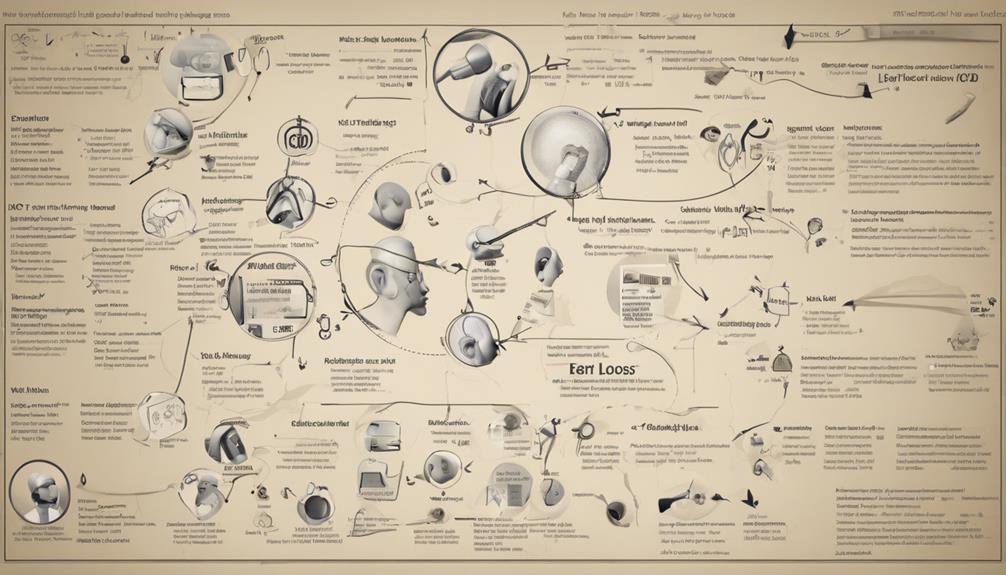
Properly documenting the specific ear affected is crucial for accurate coding of right ear hearing loss cases. When diagnosing right ear hearing loss, utilizing the ICD-10-CM code H91.91 for unspecified hearing loss in the right ear is essential.
To distinguish between right and left ear diagnoses, it's vital to use specific descriptors for the ear side. This specificity helps in avoiding confusion, especially in cases of bilateral hearing loss conditions.
Accurate documentation of the ear involved in the medical record is paramount for precise ICD-10-CM coding. Identifying the affected ear correctly not only aids in accurate coding but also plays a significant role in appropriate treatment planning and streamlined billing processes.
Frequently Asked Questions
What Is the ICD-10 Code for Right Ear Hearing Loss?
We understand the importance of accurately identifying the ICD-10 code for right ear hearing loss. It's crucial to use the correct code, like H91.91, to ensure proper documentation and billing.
This specific code falls under Diseases of the ear and mastoid process category, aiding in the classification of right ear hearing issues. Healthcare providers rely on accurate coding for effective management of patients' hearing loss.
What Is the ICD-10 Code for Restricted Hearing of the Right Ear?
We know the ICD-10 code for restricted hearing of the right ear is H91.91. This specific code falls under Diseases of the ear and mastoid process, denoting unspecified hearing loss in the right ear.
Accurate coding with H91.91 is crucial for proper documentation in medical records. It excludes conditions like abnormal auditory perception and noise-induced hearing loss.
Understanding and correctly using this code ensures precise recording of right ear hearing impairments.
What Is the ICD-10 Code for Absence of Right Ear?
We need to accurately identify the ICD-10 code for the absence of the right ear. This code is crucial for proper medical record keeping and treatment planning.
The correct code for the absence of the right ear is Q17.3, falling under congenital malformations of the ear, face, and neck. It specifies a congenital absence of the external ear, auricle, or pinna on the right side.
Accurate documentation and coding are essential for patients with this condition.
What Is the ICD-10 Code for Examination of Ears and Hearing?
We use the ICD-10 code Z01.10 for examining ears and hearing. This code is for routine general medical check-ups at healthcare providers. It covers a comprehensive health assessment, including evaluation of ears and hearing.
Z01.10 isn't specific to any particular ear condition but denotes a general exam. Healthcare providers rely on this code to document routine check-ups and screenings related to ears and hearing.
Conclusion
In conclusion, utilizing the correct ICD codes for right ear hearing loss is essential for accurate diagnosis and treatment. According to recent data, approximately 15% of adults in the United States experience some form of hearing loss in their right ear.
Proper coding not only facilitates effective communication among healthcare providers but also ensures appropriate billing and reimbursement for services rendered. Stay informed and up-to-date on the latest coding guidelines to improve patient care outcomes.




